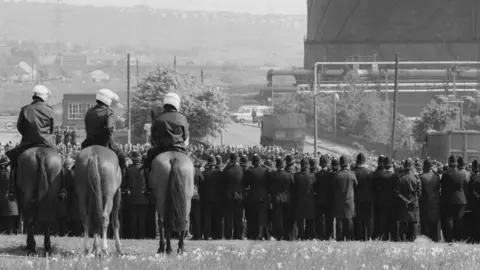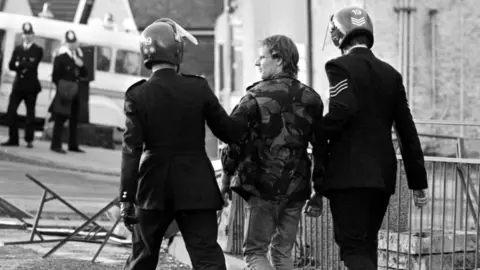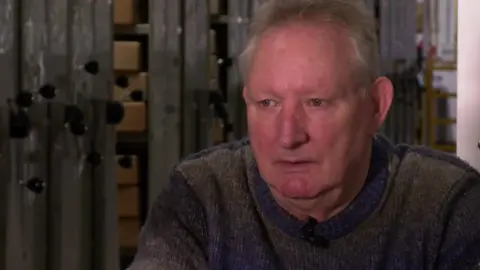South Yorkshire Police accused of cover-up over miners' strike files
 Getty Images
Getty ImagesSouth Yorkshire Police has been accused of continuing a "cover-up" of its actions during the miners' strike over a delay in making its archives public.
The force said in 2022 it intended to make some 82,000 documents relating to the strike available after a £340,000 project to digitise the files.
Campaigners claim the archive would detail the "militarisation" of policing during the 1984 strike.
The force says it remains its "intention" to open the archive .
March marks the 40th anniversary of the miners' strike, when tens of thousands of miners across the country walked out in a year-long dispute over plans to close coal mines.
The strike began in the South Yorkshire coalfields, with South Yorkshire Police playing a central role in policing the strike both locally and nationally.
Over the past four decades hundreds of government documents and files at the National Archive relating to the dispute have been opened to the public.
But the South Yorkshire Police archive has remained closed.
'State involvement'
The force told the BBC it currently holds 82,000 documents in its archive, including maps, legal files and official reports compiled by the constabulary from 1984 onwards.
But, when the BBC asked to be granted access to the archive the request was denied.
"The police operational documents are quite important" said Kate Flannery, Secretary of the Orgreave Truth and Justice campaign, a group that has called for a public inquiry into how the miners' strike was policed.
"The documents will reveal a lot about the state involvement and the militarised nature of policing during the strike," she added.
"I think the cover-up is continuing, but I'm sure there are a lot more documents being held in various buildings throughout Britain."
Public records show that in 2023 the Police and Crime Commissioner (PCC) of South Yorkshire, Dr Alan Billings, approved a "priority request" from the then Deputy Chief Constable Tim Forber to spend £340,000 on archiving, digitising and redacting the miners' strike documents the force held.
At the time the report stated the project would take two and a half years, and the money should be spent in order to "meet the publicly stated intention to publish the Miners' Strike Archive/Orgreave material, so that it is electronically accessible to all".
When asked about the delay, a police spokeswoman said: "It is absolutely our intention to open our archive to the public.
"A small team of people are working to prepare the 1,474 files of material which amount to 82,913 pages.
"They have archived the materials and are now cataloguing these and ensuring they are aligned with the requirements of GDPR as they will, in some circumstances, include personal information. This work is expected to take a further eighteen months."
 PA Media
PA MediaThe archive is likely to contain operational orders drawn up by the force during the industrial dispute.
The BBC has obtained a copy of one such order which details how the South Yorkshire constabulary planned to keep the Orgreave coking works open during the strike.
The document, dated 23 May 1984, shows how police operations were planned in advance, but makes no reference to the deployment of police horses or dogs.
Later that year, on 18 June, mounted officers would charge into the picket lines at Orgreave as some miners threw rocks at officers deployed in riot gear.
The day became known as the "Battle of Orgreave", the most violent day of the strike, which left at least 120 people - miners and police officers - injured.
Around 100 miners were arrested, but the case against them later collapsed after police evidence was deemed "unreliable" in court.
Many in the mining community believe South Yorkshire Police planned a violent confrontation with the miners at Orgreave in an attempt to break the strike.
"There's not been many in times in my life when I've been as scared as that", said Kevin Horne, a miner who was arrested at Orgreave.
"We walked straight into a trap that had been set by the police.
"What were the police orders on the day? That document has never been seen, so these police files may reveal that."
The miners' strike in 1984 was the beginning of a dark decade for South Yorkshire Police, which was also involved in the unlawful killing of 97 Liverpool supporters at the Hillsborough stadium in Sheffield five years later.
A 2013 Independent Police Complaints Commission (IPCC) report detailed that 164 South Yorkshire Police statements were altered in the aftermath of the Hillsborough disaster, where a crush killed supporters before an FA Cup semi-final.
Senior South Yorkshire officers were found to have engaged in a cover-up in an attempt to blame the Liverpool fans.
A separate IPCC investigation found the force had used similar tactics in 1984 at Orgreave, when some officers fabricated and altered their witness statements after arresting picketing miners.
During the miners' strike and Hillsborough disaster the force was led by Chief Constable Peter Wright who died in 2011.
No South Yorkshire officer has ever faced professional misconduct charges relating to either event in the 1980s.

"I've always said that we will never have the full truth about Hillsborough until we have the full truth about Orgreave", said Andy Burnham, who as a Labour MP led calls for a public inquiry to be held into Hillsborough.
"The same tactics were used against the miners as would subsequently be used against Liverpool supporters.
"I can see no good reason [for not publishing] when ex-miners and their families have asked for the release of documents in which those people are named," said Mr Burnham.
The now Mayor of Greater Manchester said an independent inquiry should be held regarding the miners' strike "so communities in the North of England can see how this emblematic dispute was actually handled by the government of the day."
In 2016 the then Home Secretary Amber Rudd MP ruled out holding an inquiry stating that it was "not in the public interest".
At last year's Trade Union Congress the Deputy Leader of Labour, Angela Rayner said the party supported "a full investigation into the violent events at Orgreave."

Follow BBC Yorkshire on Facebook, X (formerly Twitter) and Instagram. Send your story ideas to [email protected].
